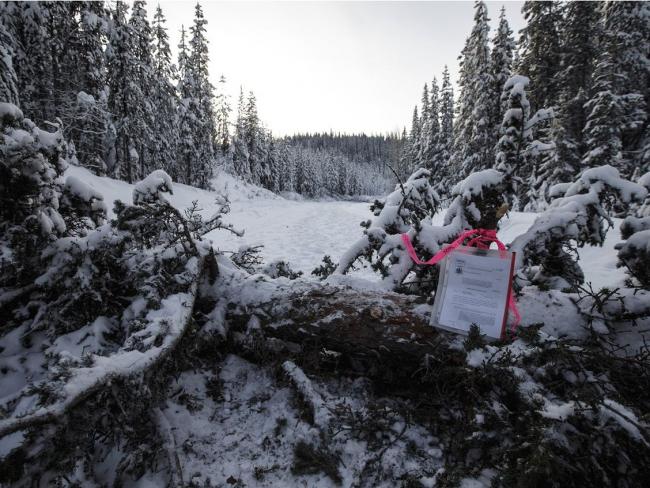Articles Menu

Dec. 13, 2021
VICTORIA — The B.C. NDP convention on Sunday called for an independent investigation into allegations the RCMP used excessive force against protesters at the standoff over the Coastal GasLink pipeline.
The party accused the RCMP of setting back reconciliation with the Wet’suwet’en Indigenous people, whose hereditary leaders oppose construction of the natural gas pipeline through their traditional territory.
The online convention also called for stronger provincial oversight of the national police force in B.C.
A motion on those points passed with 89 per cent support at the first B.C. NDP gathering since the sweeping victory in the 2020 provincial election.
“Significant concerns have been raised about the conduct of the RCMP during enforcement of a court injunction in Wet’suwet’en territory on November 18th and 19th, including the arrest of journalists and allegations of the use of excessive force,” the motion read, in part.
“Because RCMP actions have set back efforts to advance reconciliation,” it continued, “the B.C. NDP will call on RCMP Commissioner Brenda Lucki to launch an independent investigation into the conduct of police relating to the enforcement of the injunction.”
The motion also committed the B.C. NDP to “denounce the use of improper force at this or any other protest.”
Another passage noted how the NDP government’s review of the B.C. Police Act provided an opening to strengthen oversight of the RCMP, which is funded by the province.
“The B.C. NDP will call on the provincial government to ensure that all alleged incidents of improper force by police are independently investigated,” the motion declared.
Speaking in favour of the motion was cabinet minister Nathan Cullen, minister of state for lands and natural resource operations.
Cullen wrote an open letter to Lucki earlier this month, calling for her to investigate the use of “undue force” by RCMP in arresting two of his constituents.
Lucki wrote back last week to say that she couldn’t comment on “specific details” of a matter that was the subject of an “active investigation.” But she did advise Cullen that “the RCMP is legislatively required to enforce the injunction of the court.
“Where an injunction is breached, we make considerable efforts to avoid active enforcement, and instead work to peacefully resolving the conflict,” she explained. “However this is not always possible and in some cases force must be used. … Police officers will use as much force as necessary.”
Also lined up to speak in favour of the motion was Murray Rankin, the minister of Indigenous relations and reconciliation.
The time allocated for debate ran out before he got a chance to explain his support.
Rankin has led the NDP outreach to the Wet’suwet’en this past year, but the motion called on the government to “redouble” its efforts.
The motion was put forward by the NDP local in the Cowichan Valley, the constituency represented by Green Leader Sonia Furstenau.
On Vancouver Island, far from being accused of going too far on environment issues, the New Democrats are more likely to be denounced for half measures.
As an example, consider the comments from Ashley Zarbatany, a delegate from the North Island riding and newly elected chair of the NDP standing committee on the economy and the environment.
She announced grudging support for the resolution on police oversight in Wet’suwet’en territory.
She also delivered a withering denunciation of its limitations in a speech she later posted on her social media account.
“This resolution doesn’t address the heart of this issue which is that our government is not only culpable for its role in deploying RCMP resources for this raid but has repeatedly violated the rights of the Wet’suwet’en hereditary leadership to say no to pipelines on their unceded territories,” declared Zarbatany.
She faulted the government for “hypocritically” enshrining the UN Declaration on the Rights of Indigenous Peoples into law “with a time stamp” that exempted previously approved projects like Coastal GasLink from obligation to obtain free, prior and informed consent from Indigenous people.
“Our government knows this,” Zarbatany continued, “but instead has obfuscated its role, engaged in classic divide and conquer colonial tactics, spread misinformation, and exploited peoples vulnerable situations, which they caused in the first place through chronic underfunding and genocidal policies.”
Not content with accusing the NDP government of complicity, hypocrisy, obfuscation and promoting genocidal policies in dealing with Indigenous people, she also blasted it for pursuing “Christy Clark’s LNG pipeline.”
Coastal GasLink will feed the LNG Canada terminal now under construction at Kitimat. Both are supported by the NDP government.
“The LNG debate is what should be on the floor today, is way overdue and is at the heart of this issue,” said Zarbatany. “Members have tried to bring forward LNG debate for over two years, but we’ve been blocked every time.
“Now we’re losing some of our best activists over this issue, alienating an entire generation of young people who are relying on us to address the climate emergency.”
Those comments, levelled by the chair of a key party committee, confirmed that the NDP brass worked behind the scenes to downgrade or sideline motions critical of the government on the LNG file.
Still, the motion that did survive the screening process illustrates the NDP’s impossible balancing act on the file.
The attack on the RCMP tried to align the party with the anti-pipeline protesters. It didn’t go far enough for green-leaning NDP supporters who want LNG stopped now.
[Top photo: A notice to clear the road from RCMP sits in a tree fell across the road block access to Gidimt'en checkpoint near Houston, B.C., on Jan. 8, 2020. PHOTO BY JASON FRANSON /THE CANADIAN PRESS]